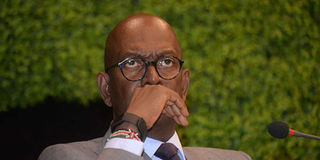Kenyans, it’s time to stop the hate and learn to love our own

Safaricom Chief Executive Officer Bob Collymore leads the occasion where the telco's financial results for the year ending March 31, 2019 were announced, at Safaricom House, Nairobi, on May 3, 2019. The government indicated that it wants a Kenyan to replace Collymore, whose term is ending in August. PHOTO | SALATON NJAU | NATION MEDIA GROUP
What you need to know:
- If we bought local products, as a survey by Kenya Association of Manufacturers shows, we can create more than 300,000 new jobs from the sector alone.
- If we cannot trust our own more than 50 years after independence, then it is a sign we need to decolonise the minds of our citizens.
If social media is the bellwether of public opinion, then Kenyans are against one of their own being picked as the successor to Safaricom Chief Executive Officer Bob Collymore.
When the government indicated that it wants a Kenyan to replace Collymore, whose term is ending in August, Twitter, WhatsApp and Facebook erupted, with many opposing the appointment of a Kenyan to head the most profitable company in the region.
With the arrogance of an avocado seller when the fruit is off-season, social media users outlined one reason after the other why a Kenyan should not be considered leave alone be appointed.
They cited how Kenyan executives have mismanaged parastatals, run down private firms and are as corrupt as the men who used to divide food rations during communism eras.
This is despite the fact that no name had been floated for appointment. It was a wholesale condemnation.
INTENSE DISLIKE
While Safaricom has the right to pick the best candidate who can steer the firm well, the fact that Kenyans can campaign against another Kenyan who has not even been identified yet revealed the skin-deep hatred that we have for our own.
We hate on our local talent, our locally manufactured goods and services, and even end up hating the very country we live. Yet we expect others to love it and market it.
You can see it anywhere, from the hawker in the street to the top executive. When buying a shirt, a hawker will extol the product that it is made in Turkey so that he can justify the high price tag.
A Kenyan one is treated as an inferior product. It is the same thing that our musicians were complaining about the airwaves being dominated by foreign artistes yet sometimes locals have better tunes.
PRIDE
Some foreign musicians, with videos that look like they were shot inside a cupboard with the same camera that recorded Queen Elizabeth’s wedding to Prince Philip in 1947, even command higher performance fees than their superior local counterparts.
We buy South African oranges at a higher price then bemoan how our parents cannot make money from agriculture back home.
Nowadays, even middle class parents take pride in the fact that their children cannot speak local languages. It is worn like a badge of honour that a child does not speak Swahili.
I have even heard presenters and communication experts being proud that they cannot speak Swahili yet it is the most spoken language in East Africa. So, who are you communicating to?
Failure to support local talent and produce is akin to shooting yourself in the foot then expecting to run a marathon.
EMPLOYMENT
If we bought local products, as a survey by Kenya Association of Manufacturers shows, we can create more than 300,000 new jobs from the sector alone. If you use local materials to build a house, you create at least 15 jobs.
The current drive to stop importation of vehicles in favour of locally manufactured cars is also a boost to the economy but is being fought from all sides.
As a Kenyan, it is ironic that you expect to graduate, get a job and be able to raise a family in a decent way yet you hate anything Kenyan.
So, where will that job you are looking for come from if you cannot buy local?
If you encourage the biggest company in the country not to hire a Kenyan, where will your job come from if others also take the same cue?
How will your son or daughter’s music or film career take off if you only watch Hollywood, Bollywood or Nollywood?
ROLE MODELS
Granted, Kenyans have been let down by some of our own before who have mismanaged institutions.
They have stolen from schoolchildren, starving countrymen and plundered the youth’s future. But other Kenyans like Equity Bank CEO James Mwangi and KCB boss Joshua Oigara have also built successful multibillion shilling banks, Cellulant founder Ken Njoroge has developed award winning apps that are being used across Africa.
Others like teacher Peter Tabichi are using their skills to make the future of our children brighter while Eliud Kipchoge is proving Kenya is mecca for athletes. The list of Kenyans’ achievements is endless.
Both the Kenyans and foreigners can also be thieves, corrupt and inefficient. It is not a uniquely Kenyan problem.
TRUST
We should evaluate each person on their merits and demerits not their nationality.
Thus, condemning all Kenyan professionals as unworthy of leadership positions is not only nauseating but also self-defeating. It is the symptom of a country that has lost faith in its leadership, output and its country.
If we cannot trust our own more than 50 years after independence, then it is a sign we need to decolonise the minds of our citizens.
The writer is the Assistant Editor, Sunday Nation; [email protected]




